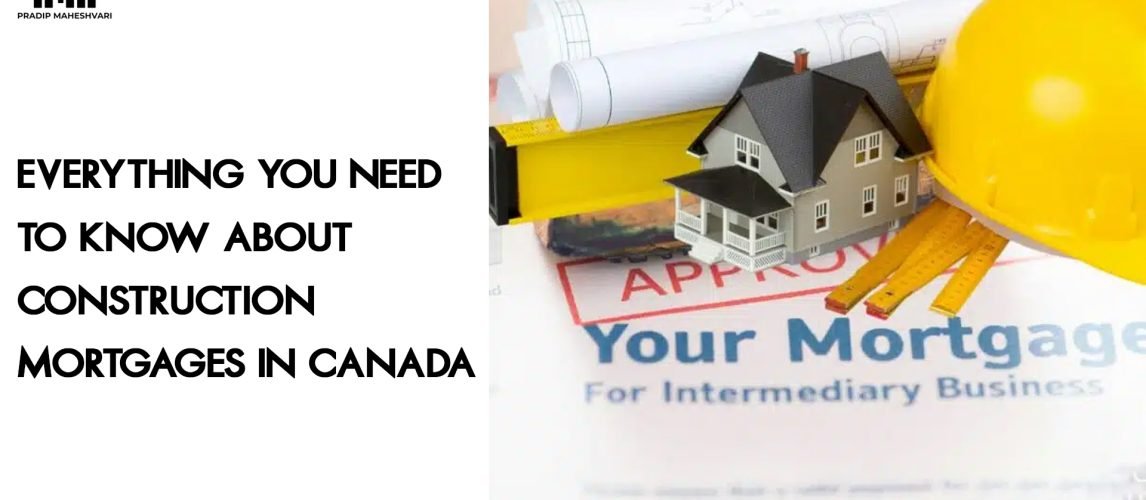Building your own home is a big decision, but funding the project doesn’t have to be complicated. If you’re planning to construct a new home or undertake a major renovation, a construction mortgage could be the solution you need.
So, what exactly is a construction mortgage in Canada? How does it work, and is it the right option for your project?
Let’s break it down step-by-step so you can make the best decision for your financial situation.
What is a Construction Mortgage?
A construction mortgage is a loan designed specifically to help you finance the construction of your new home or a major renovation. Unlike a regular mortgage, where you receive a lump sum upfront, a construction mortgage is paid out in stages as work progresses on the property.
Key Features of Construction Mortgage:
- Disbursed in Stages: Funds are released as your project reaches certain milestones—such as after laying the foundation or completing the roof.
- Interest-Only Payments Initially: During construction, you typically only make interest payments on the amounts disbursed. This can reduce your monthly payments until the project is completed.
- Short-Term Loan: These mortgages are often shorter-term loans, usually lasting between 12 and 24 months. Once construction is complete, they typically convert into a standard mortgage.
How Does a Construction Mortgage Work?
Now that we know what a construction mortgage is, let’s dive into how it actually works.
- Pre-Approval and Loan Application:
Like any other mortgage, you must apply and be pre-approved before securing the loan. The lender will assess your financial stability, credit score, and the viability of your construction project.
- Loan Disbursements Based on Progress:
Unlike a regular mortgage where you receive the full loan amount at once, the lender will release funds in stages. Each payment corresponds to a specific point in the construction process. This ensures funds are available when you need them, but also ensures the project is progressing as planned.
- Interest-Only Payments During Construction:
Until the construction is complete, you’ll only need to make interest payments on the funds that have been disbursed. This can help lower your monthly payments during the building process.
- Conversion to Regular Mortgage:
Once your home is built, the loan typically converts into a regular mortgage, where you’ll begin paying both principal and interest.
Is a Construction Mortgage Right for You?
While construction mortgages can be a great way to fund your building project, they might not be suitable for everyone. Consider the following factors before making a decision:
Questions to Ask Yourself:
- Do you have a solid construction plan?
You’ll need a detailed project budget, timeline, and contractor to secure a construction mortgage. - Can you handle fluctuations in payments?
Since payments are based on progress, unexpected delays or budget overruns could affect your financing. - Are you prepared for inspections and paperwork?
Construction projects are subject to inspections at various stages to ensure that work is progressing as expected.
Pros and Cons of Construction Mortgages
Before committing to a construction mortgage, it’s important to weigh both the benefits and potential drawbacks. Here’s a quick comparison:
| Pros | Cons |
| Flexible Payments: Funds are released as the project progresses. | Higher Rates: Interest rates can be higher than regular mortgages. |
| Lower Monthly Payments: You only pay interest during construction. | More Paperwork: You need to submit detailed plans and budgets. |
| Short-Term Loan: Typically lasts 12 to 24 months, then switches to a regular mortgage. | Budget Risks: Unexpected costs or delays may increase your total expenses. |
| Tailored to Your Needs: Payments are based on specific construction stages. | Strict Timelines: Delays |
Key Considerations When Applying for a Construction Mortgage
Applying for a construction mortgage is different from securing a regular mortgage. Here are some things you’ll need to consider:
- Detailed Construction Plan: Lenders will require a comprehensive plan that outlines the entire project, including a breakdown of costs and timelines.
- Qualified Contractors: You must work with a licensed and experienced contractor who can meet deadlines and adhere to the agreed-upon budget.
- Scheduled Inspections: The lender will likely require inspections at various stages of the build to ensure everything is progressing as planned.
Conclusion: Let Pradip Maheshvari Mortgages Guide Your Construction Project
A construction mortgage can help you build the home of your dreams, but it’s important to understand how it works and if it’s the right choice for your situation. Whether you’re building from the ground up or undertaking a major renovation, a construction mortgage provides the flexibility to finance your project as it progresses.
At Pradip Maheshvari Mortgages, we specialize in helping clients secure the right mortgage for their building projects. We’ll guide you through every step of the process
Get In Touch Today! & Explore the best mortgage solution for your construction project.
You Might Also Like:


No comment yet, add your voice below!